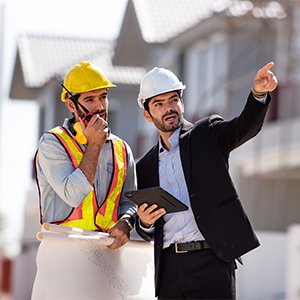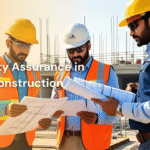
Quality Assurance in Construction You Can Trust: Building with Confidence in Pakistan
May 24, 2025
Benefits of Building a Custom House in Lahore
May 27, 2025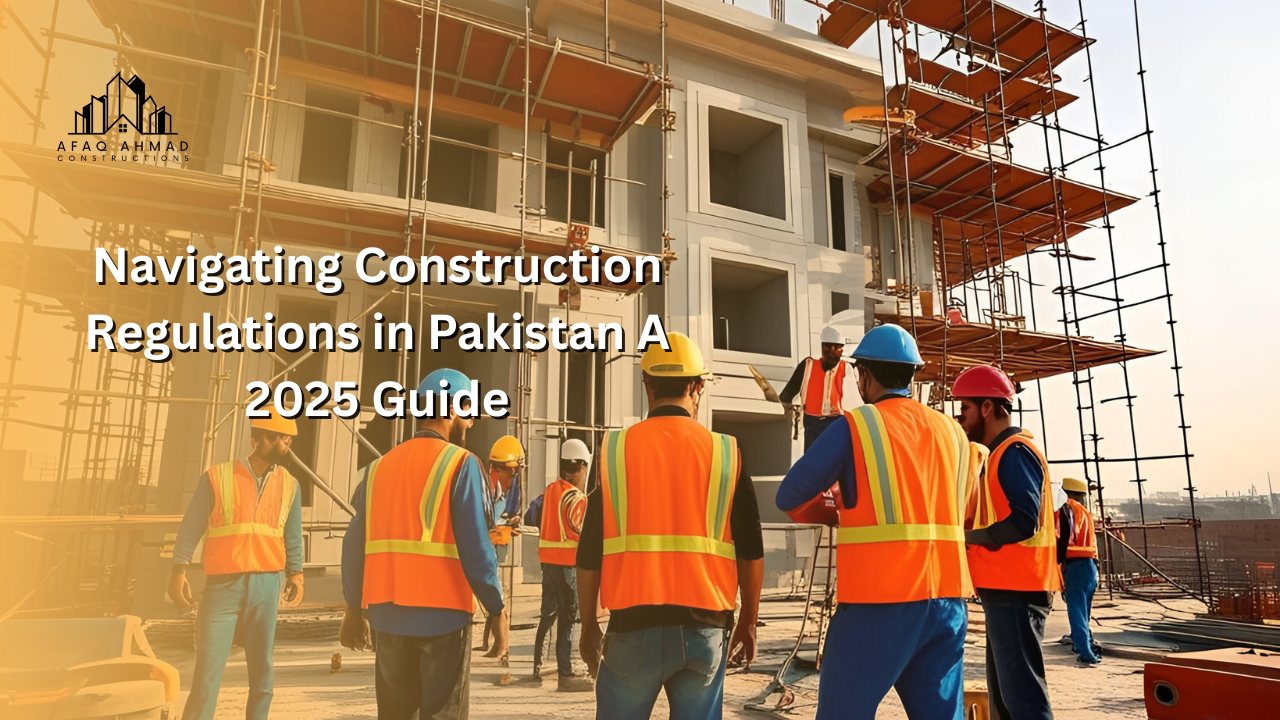
As the construction industry in Pakistan thrives in 2025, navigating the complex web of regulations has become a critical skill for builders, developers, and homeowners alike. Lahore is buzzing with construction activity, from new homes in DHA Lahore to commercial projects in Bahria Town. With the sector projected to grow at an annual average rate of over 5% from 2025 to 2028, understanding and complying with construction regulations is essential for success. At Afaq Ahmad Constructions, we’ve compiled this 2025 guide to navigating construction regulations in Pakistan, offering insights into legal requirements, safety standards, and practical tips to ensure your project in Lahore or beyond meets all necessary guidelines.
The Importance of Construction Regulations in Pakistan
Construction regulations in Pakistan are designed to ensure safety, sustainability, and quality across all projects, from residential homes to large infrastructure developments under the China-Pakistan Economic Corridor (CPEC). These rules address the country’s diverse climate—Lahore’s scorching summers and monsoon rains—and seismic risks in northern regions. Compliance not only protects lives and property but also enhances project credibility, avoids legal penalties, and supports the growing demand for eco-friendly and resilient buildings, a trend we explored in our construction design trends blog.
In 2025, with rising material costs and a housing deficit of 10 million units, regulations also aim to optimize resource use and ensure fair practices. For developers in Lahore’s premium societies like Lake City and Lahore Smart City, adhering to these standards is key to delivering projects that meet client expectations and regulatory scrutiny.
Overview of Key Construction Regulations in Pakistan
Pakistan’s construction regulatory framework is a mix of national and provincial guidelines, shaped by government bodies, engineering councils, and international standards. Here’s a breakdown of the key regulations relevant in 2025:
1. Pakistan Building Code (PBC)
The Pakistan Building Code, managed by the Pakistan Engineering Council (PEC), sets minimum standards for design, construction, and safety. Updated versions, such as the Building Code of Pakistan 2021 and the upcoming Green Building Code of Pakistan 2023, reflect modern needs:
- Seismic Provisions (2007, with 2021 Updates): Mandates earthquake-resistant design, critical for Pakistan’s tectonically active regions. The 2021 update incorporates a probabilistic seismic hazard analysis (PSHA) using advanced methodologies, ensuring structures can withstand a 1% probability of collapse in 50 years.
- Energy Provisions (2011): Promotes energy-efficient designs, such as insulation and solar integration, aligning with sustainable trends we’ve discussed.
- Fire Safety Provisions (2016): Requires fire-resistant materials and escape routes, essential for multi-story buildings in Lahore.
- Green Building Code (2023, Launching Soon): Expected to emphasize rainwater harvesting and eco-friendly materials, supporting the sustainability focus in 2025.
2. Provincial Building Bylaws
Each province and major city has its own bylaws, often stricter than national codes:
- Lahore Development Authority (LDA) Building and Zoning Rules: Govern land use, building heights, and setbacks in Lahore. For instance, DHA Lahore projects must comply with specific zoning for luxury homes, while Eastern Housing follows LDA-approved layouts.
- Karachi Building and Town Planning Regulations: Focus on urban density and safety in high-rise zones.
- Punjab Development of Cities Act (2018): Enforces master plans and environmental clearances, impacting projects in Lahore’s expanding societies.
3. National Environmental Quality Standards (NEQS)
Under the Pakistan Environmental Protection Act (1997), NEQS regulates construction-related environmental impacts. In 2025, large projects like those in Lahore Smart City require Environmental Impact Assessments (EIAs) to mitigate ecological harm, a practice gaining prominence as noted in our quality assurance blog.
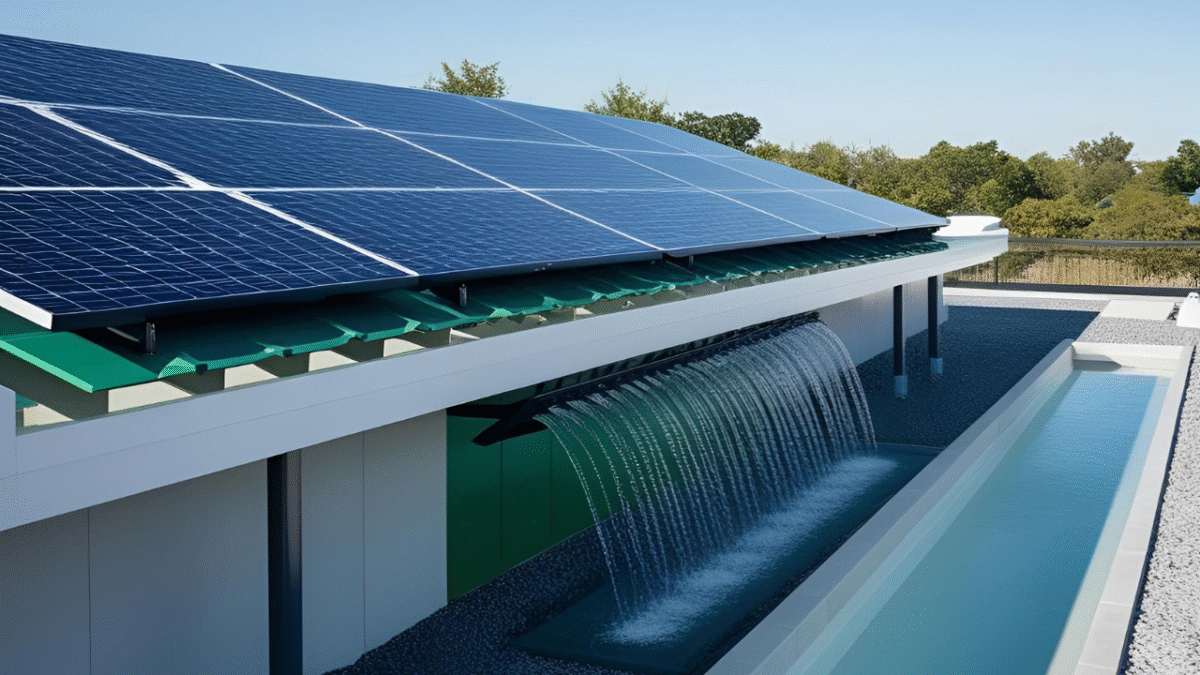
4. Occupational Health and Safety (OHS) Regulations
The Pakistan Occupational Health and Safety Act (2018 draft) mandates safe working conditions, including training and equipment for workers. This is crucial in Lahore, where labor-intensive projects in Bahria Town demand strict safety protocols to prevent accidents.
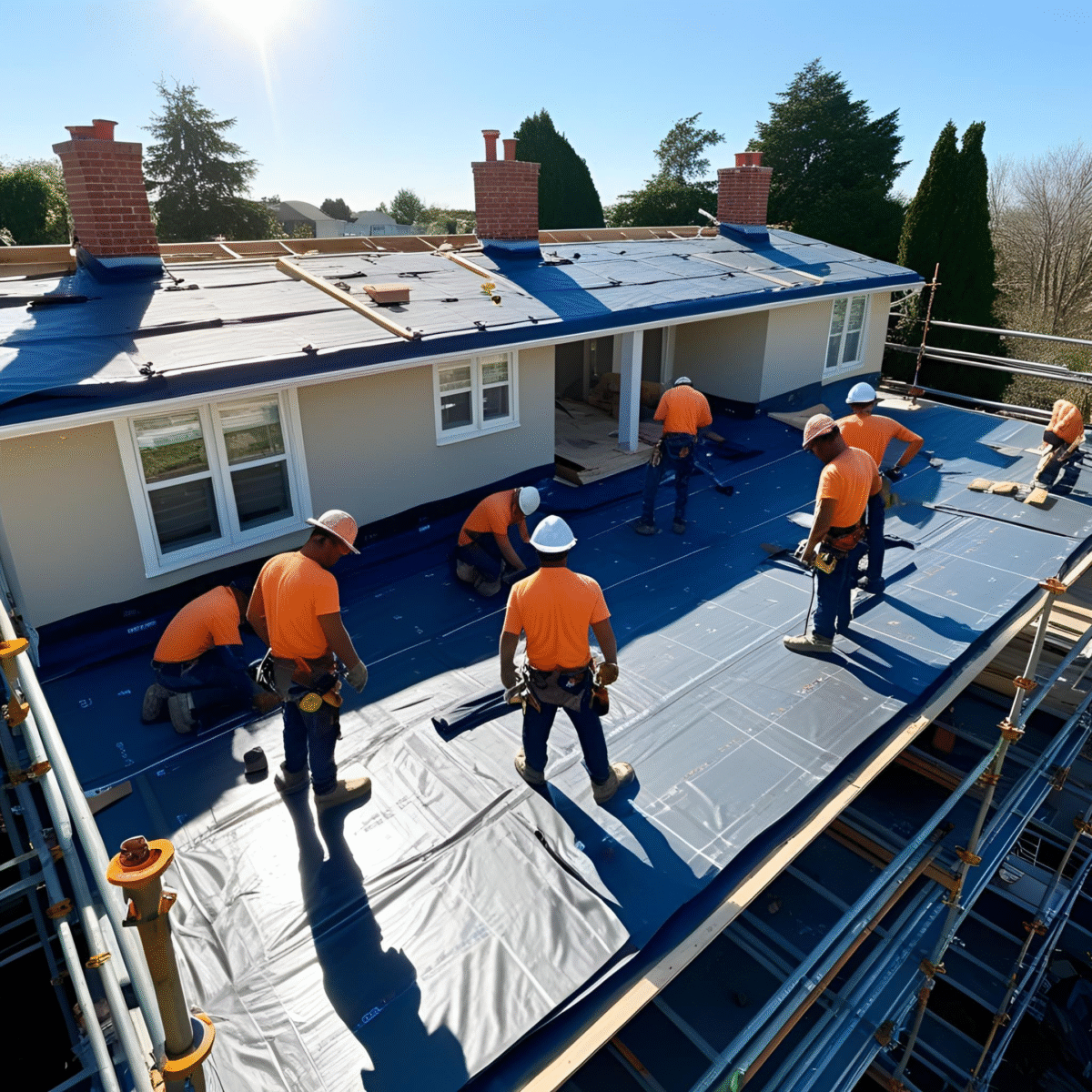
5. Naya Pakistan Housing Program (NPHP) Guidelines
Launched by the Naya Pakistan Housing & Development Authority (NAPHDA), this initiative sets standards for affordable housing, influencing construction in urban and rural areas. In 2025, it emphasizes cost-effective designs and compliance with national codes, affecting projects across Lahore.
Key Regulatory Processes in 2025
Navigating construction regulations involves several steps, each critical for project approval and execution:
1. Site Selection and Soil Testing
As highlighted in our soil testing blog, assessing soil conditions is a regulatory prerequisite. In Lahore, LDA requires geotechnical reports for multi-story buildings, ensuring foundations can handle local soil variations, such as those near the Ravi River. Methods like the Standard Penetration Test (SPT) and Cone Penetration Test (CPT) are commonly used by firms like Soil Testing Services (STS).
2. Obtaining Permits and Approvals
Before breaking ground, developers must secure:
- Land Title Verification: Confirming ownership with the revenue department.
- Building Plan Approval: Submitting architectural plans to LDA or relevant authorities, often requiring PEC-registered engineers’ signatures.
- Environmental Clearance: Mandatory for projects over a certain size, involving NEQS compliance.
- NOCs: No Objection Certificates from fire, water, and electricity departments, varying by location.
In Lahore, permit fees can range from PKR 50,000 to 150,000, as noted in recent construction cost guides, depending on project scale.
3. Compliance During Construction
Regulations mandate ongoing oversight:
- Inspections: LDA conducts milestone checks, such as foundation and roofing stages, to ensure adherence to approved plans.
- Quality Assurance: As explored in our QA blog, regular material testing (e.g., concrete slump tests) and worker safety audits are required.
- Progress Reporting: Developers must submit updates to authorities, especially for CPEC-related projects.
4. Post-Construction Certification
Upon completion, a certificate of conformity from a PEC-registered engineer or architect is needed, confirming compliance with the PBC. This step is vital for occupancy permits in societies like DHA Lahore.
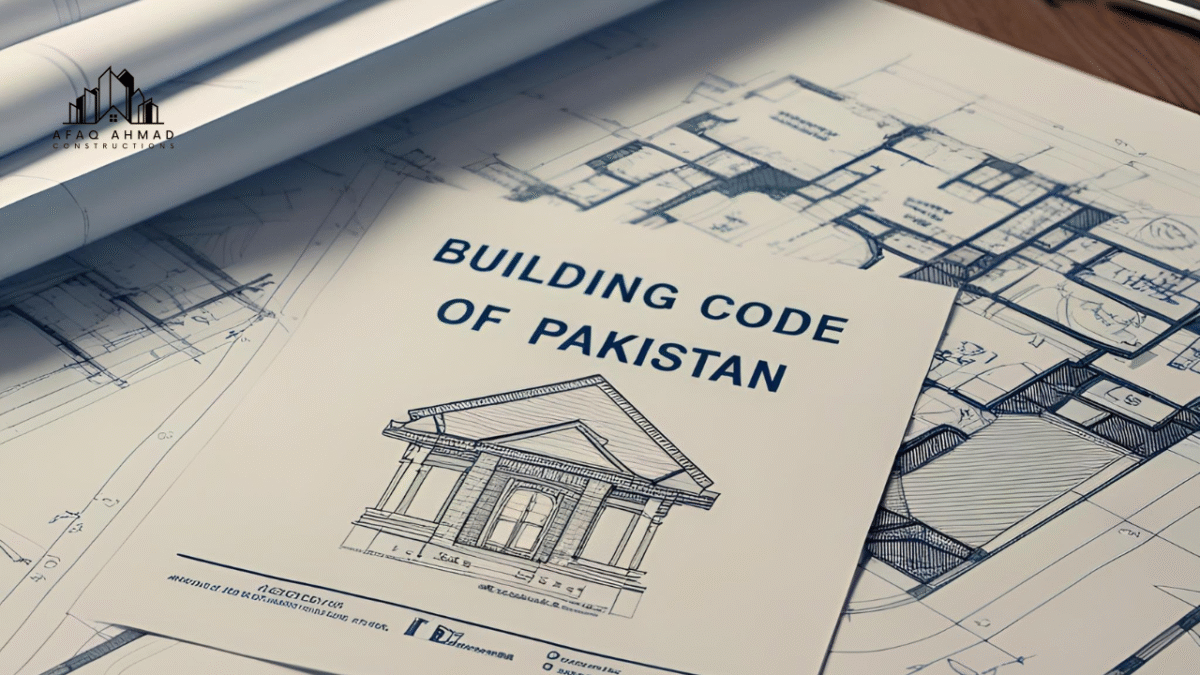
Challenges in Navigating Regulations
Despite their importance, construction regulations in Pakistan pose several challenges in 2025:
- Inconsistent Enforcement: While national codes exist, provincial bylaws can differ, leading to confusion. For example, LDA rules may conflict with Punjab’s Development Act in some cases.
- Bureaucratic Delays: Permit approvals can take weeks or months, delaying projects in Lahore’s fast-paced market.
- Lack of Awareness: Small developers often bypass regulations due to limited knowledge, risking penalties or project rejection.
- Cost Implications: Compliance with seismic and environmental standards increases initial costs, though long-term benefits outweigh these, as seen in sustainable designs.
- Corruption and Bribery: Anecdotal evidence suggests informal payments can expedite processes, undermining regulatory integrity.
Practical Tips for Compliance in 2025
Navigating these regulations requires a strategic approach:
- Hire Licensed Professionals: Engage PEC-registered engineers and architects to ensure designs meet PBC standards. This also streamlines permit approvals.
- Conduct Thorough Site Assessments: Invest in soil testing and EIAs to avoid future legal or structural issues, a practice we’ve emphasized in previous blogs.
- Stay Updated: Regularly check PEC and LDA websites for updates, such as the upcoming Green Building Code 2023.
- Plan for Contingencies: Budget for permit fees, inspections, and potential delays, aligning with the cost management tips from our construction cost guides.
- Leverage Technology: Use Building Information Modeling (BIM) and drone inspections, trends we noted in our construction design blog, to enhance compliance and efficiency.
- Partner with Reputable Firms: Companies like Afaq Ahmad Constructions can guide you through regulatory mazes, ensuring seamless project execution.
Regional Focus: Construction Regulations in Lahore
Lahore’s unique position as a cultural and economic hub shapes its regulatory landscape:
- LDA Oversight: The LDA enforces zoning, height restrictions, and safety standards, particularly in premium areas like DHA Lahore and Bahria Town. For instance, high-rise approvals require detailed seismic analysis under PBC 2021.
- Environmental Concerns: With air quality issues and monsoon flooding, projects must include drainage plans and NEQS-compliant waste management, affecting societies like Lake City.
- Smart City Regulations: Lahore Smart City aligns with national codes but adds smart technology standards, requiring QA for IoT integration, as discussed in our quality assurance blog.
The Future of Construction Regulations in Pakistan
In 2025, Pakistan’s regulatory framework is evolving to meet global standards and local needs:
- Digital Transformation: Online portals for permit applications and tracking, similar to those in India, are being piloted, reducing bureaucratic delays.
- Sustainability Push: The Green Building Code 2023 will mandate eco-friendly practices, influencing Lahore’s luxury projects.
- Seismic Upgrades: Enhanced seismic provisions, based on the 2021 PSHA, will strengthen designs in earthquake-prone areas.
- CPEC Influence: Infrastructure projects under CPEC will adopt international codes, setting a benchmark for quality and safety.
How Afaq Ahmad Constructions Can Help
At Afaq Ahmad Constructions, we specialize in navigating Pakistan’s construction regulations with expertise and care. Our services include:
- Regulatory Consultation: Guiding you through LDA approvals and PBC compliance.
- Geotechnical and QA Support: Ensuring soil testing and quality checks meet standards.
- Sustainable Design: Integrating green practices to align with upcoming codes.
- Project Management: Overseeing milestones to avoid regulatory pitfalls.
Whether you’re building in DHA Lahore or Lahore Smart City, we ensure your project complies with all 2025 regulations. Contact us today for a consultation.
Conclusion
Navigating construction regulations in Pakistan in 2025 is a complex but rewarding endeavor, ensuring safety, sustainability, and success for your project. From the Pakistan Building Code to provincial bylaws and environmental standards, compliance is key to building with confidence in Lahore’s thriving market. By staying informed, leveraging technology, and partnering with trusted firms like Afaq Ahmad Constructions, you can turn regulatory challenges into opportunities for excellence. Let’s build a future that meets today’s standards and tomorrow’s needs.




